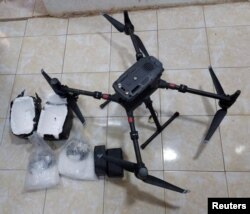When Jordan and other Arab nations brought Syria back into the Arab League, one of the conditions was that it tackle its burgeoning unregulated drug production and stop using Jordan as a transit point for its criminal drug trade to wealthy Gulf nations. However, observers say they are seeing little action from Damascus.
On Monday, Jordan's border forces shot down a drone carrying two kilograms of crystal methamphetamine from Syria. The bust came just a day after Syrian and Jordanian security officials met in Amman to discuss how to end illegal cross-border drug smuggling. Damascus has pledged to rein in its flourishing criminal drug trade in exchange for changing its pariah status with its 2011 brutal civil war.
Observers blame the Syrian leadership of Bashar al-Assad, its military and Iran-backed militias in southern Syria for overseeing the smuggling of mainly the amphetamine Captagon, which is cheaply produced and very addictive, destined for Gulf Arab states. The Syrian government denies any involvement in the production of Captagon.
Jordanian analyst Amer al-Sabaileh, a nonresident fellow at the Washington-based Stimson Center, tells VOA that it is unlikely in the short-term that Syria will do much to stop the multibillion-dollar a year illicit drug flow, especially as its official economy tanks.
"On the ground things are too much rooted in the region, networks are very big. The parallel economy in Lebanon, Syria, Iraq, groups, militias are depending totally on this income for years now, especially since the sanctions that took place over Syria and Lebanon," he said. "These networks are very strong, very deeply rooted, and the economy of these parts of the region is depending on this trade."
Jordan's foreign minister, Ayman al-Safadi, told the online meeting of the U.S.-led global coalition to combat illicit drug trafficking earlier this month that in the past few years alone, Jordanian authorities had seized more than 65 million Captagon pills. The only way to combat the unregulated trade, he said, was through a collaborative effort.
It's believed that Jordan used a targeted airstrike in May against a drug dealer inside Syria. Observer Baria Alamuddin, writing in the Saudi Arab News, suggested Jordan will use its military "inside Syria if narcotic smuggling is not brought under control."
Alamuddin, al-Sabaileh and other observers say it's not only drugs being smuggled, but also weapons.
"The Assad clan have flooded the region with tons of narcotics, while becoming notorious for smuggling weapons, people and contraband goods. States such as Jordan and Lebanon have been doubly afflicted —awash with cheap, deadly drugs, and also enmeshed in the transit of these products," Alamuddin wrote. "If Damascus desires to benefit from re-established trade relations with Arab nations, it should disabuse itself of the fantasy that its future prosperity is based on the narco-state model."
Al-Sabaileh warns that security services battling drugs may be "a tool for infiltration" for the Syrian regime's backer, Iran.
"This is not just drugs, in my opinion. It's a tool of infiltration for the region," he said. "The aim is transforming Jordan to be a hub, not just for drugs but as well for weapons. Worrying now is also how to transform Jordan to be a transitionary point for weapons to go to the West Bank. This is a declared old goal of the Iranians. There are Iranian militias in the south of Syria working is not just to generate money. It is something that goes beyond."
In a separate incident, Jordan charged a lawmaker, Imad al-Adwan, in May with transporting weapons in his car with the intention of traveling to the West Bank. Israel arrested him at a border crossing after guns were found inside his car. Meanwhile, weapons stockpiles have been found in the city of Jenin. Earlier this month, the United States set up a global coalition of 97 countries, including Jordan, to combat the threat of synthetic drugs such as Captagon and fentanyl.






